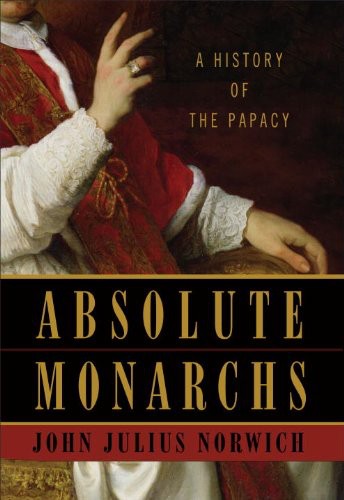
Absolute Monarchs
A History of the Papacy
کتاب های مرتبط
- اطلاعات
- نقد و بررسی
- دیدگاه کاربران
نقد و بررسی

May 15, 2011
From the disciple Peter to the reigning Benedict, accomplished British historian Norwich (The Middle Sea: A History of the Mediterranean, 2006, etc.) fashions a spirited, concise chronicle of the accomplishments of the most noteworthy popes.
The author is comfortable navigating this vast terrain, which is essentially the history of Christianity—and he even manages to make the numbing litany of events palatable. Moreover, Norwich is not above questioning historical interpretation, such as over the controversy over John Paul I's death in 1978—was he murdered? With Jesus' pronouncement to his disciple Simon, that "Thou art Peter, and on this rock I will build my church," the leaders of the fledgling Christian church began to organize themselves. Norwich doesn't dwell on St. Paul, but subsequent church elders in the first two centuries CE were Levantines—centered in the Greek-speaking world of the eastern Mediterranean—working to establish churches despite Roman persecution and mostly in Asia. The emperor Constantine's adoption of Christianity in the fourth century, and construction of a basilica dedicated to St. Peter on the Vatican Hill, boosted Christianity's profile enormously. However, marauding hordes laid waste to Rome over the centuries, and early popes had to solidify doctrine and orthodoxy, notably in the time of Gregory the Great and Leo II (who crowned Charlemagne). Norwich lingers over the schism between the Western and Eastern churches, the leaders of the Crusades, the seven popes who resided in Avignon, the rebuilding of the Roman Church during the Renaissance beginning under Nicholas V, the "monsters" (Alexander, Julius), the patrons of the arts (Leo X) and the rulers during the Counter-Reformation, who checked the tide of Protestantism. The author gracefully navigates through the challenges of the Age of Reason, revolution, the Risorgimento and the World Wars, examining the papal responses—e.g., Pius XII's silence in the face of the persecution of the Jews.
Norwich doesn't skirt controversies, ancient and present, in this broad, clear-eyed assessment.
(COPYRIGHT (2011) KIRKUS REVIEWS/NIELSEN BUSINESS MEDIA, INC. ALL RIGHTS RESERVED.)

February 1, 2011
When Norwich writes, I read; this member of the House of Lords is a notable and engrossing historian, perhaps best known for his monumental study of Byzantium. Here he offers a history of the nearly two-millennia-old papacy that should be popular with many readers.
Copyright 2011 Library Journal, LLC Used with permission.

June 1, 2011
Today, many in the West view monarchy as an absurdity or, at best, a quaint anachronism. Yet, millions remain loyal to the oldest absolute monarchy in history, the papacy. Historian, travel writer, and television documentarian Norwich presents an excellent, often surprising history of that 2,000-year-old institution. As a self-described agnostic Protestant, he hasn't attempted a religious or doctrinal history. Rather, he focuses on political history as he traces the evolution of the papacy as an institution, while at the same time providing entertaining profiles of the most historically significant popes. He begins, naturally, with St. Peter and offers some fascinating speculations about the Petrine claim to the keys to the kingdom. He views some pontiffs with admiration; for instance, Leo the Great, who courageously saved Rome from being sacked by the Huns. Others, such as Innocent III, he describes as ruthless power brokers. Norwich reserves special contempt for Pius XII, whom he characterizes as a virulent anti-Semite and moral coward for his refusal to actively oppose the Holocaust. An outstanding historical survey.(Reprinted with permission of Booklist, copyright 2011, American Library Association.)

























دیدگاه کاربران